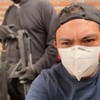21 bodies were discovered in a mass grave in Ciudad Obregón
The discovery of 21 bodies this week in a clandestine grave in the northern Mexican state of Sonora happened thanks to an anonymous tip. A man told the group of women looking for their missing family members to take an excavator to the backyard of an ordinary-looking house in a low-income neighborhood in Ciudad Obregón, a six-hour drive from the U.S.-Mexico border. “The tip that asked us to take an excavator changed it all,” Nora Lira, who is part of the “las Rastreadoras” group (searchers in English), made up mostly of mothers and wives looking for their missing relatives, told VICE World New. “It never crossed our minds that we were gonna find that many bodies.” The grisly discovery points to a growing trend among organized crime groups in Mexico. Increasingly, they are hiding the bodies of their victims rather than killing them and leaving them to be collected by officials. The strategy brings down homicide numbers but could mean that killings are still on the rise, despite government claims to the contrary.As soon as Lira’s group dug up the first collection of putrid bones, they called the authorities for help. Sonora’s prosecutor's office said Monday that they’d found 17 bodies. A day later, the number grew to 21, according to Lira. Photos shared on Twitter by Sonora's prosecutor’s office show an excavator digging deep in the backyard of a small blue house. The windows of the house are blocked with cement bricks and the residence looks completely abandoned. The bodies were buried outside the walls of the house, and in full view of the neighbors, according to the government photos of the site. Mexico’s homicide rates have been steadily dropping since last year, according to official figures. But instead of being the good news that the administration of Mexican President Andrés Manuel López Obrador claims, it could be signs of a macabre trend: Mexican drug cartels seem to have upped the practice of hiding the dead bodies of their victims instead of leaving their bodies where they drop. In January 2022, homicides dropped by 14 percent compared to the same month last year, according to Mexico’s National Security Strategy, totaling 2,427 during January this year—a five-year low for that period. At the time when former President Felipe Calderón launched Mexico’s war on drug cartels in 2006, there were less than 600 people reported missing. Ten years later, that number reached 14,400. Today, there are more than 240,000 people on the missing persons register, and more than 80 percent of them disappeared in the last ten years, according to statistics from Mexico’s National Search Commission. In the state of Sonora, four people go missing every day. During 2021, 79 clandestine graves were found, according to local reports. Sonora’s prosecutor’s office recorded 37,000 murders during 2021, while around 10,000 were reported missing the same year. The state ranks as the seventh-worst of Mexico’s 32 states for homicides rate, and eighth worst for missing persons. In the bordering state of Sinaloa, home to the eponymous cartel, numbers show that reported disappearances outnumber murders by 40 percent, according to a 2021 report made by Sinaloa’s think tank Institute for Economy and Peace. “Many of these disappearances might not be directly linked to criminal organizations, but might be victims of cartel recruiting, kidnapping or exploitation,” said Castilla. “The clearest evidence we have of this is what happened in Michoacán during a funeral,” Mexico's former Federal Police chief, Manelich Castilla, told VICE World News. On the last days of February, armed gunmen burst into a funeral in the violence-ravaged state of Michoacán, lined mourners up against a wall, and executed an estimated 17 people. After the attack, the bodies were removed and the scene was cleaned by the aggressors. The bodies have yet to be found. Lira started the Rastreadores group after her teenage daughter went missing in 2018. She found her remains last year in a clandestine grave. She said she has asked herself why would someone hide the bodies of the victims. "We think it’s because if there is no body, there is no crime.”
Advertisement
The corpses were of people killed between six months and a year ago, according to a statement from the prosecutor's office. None of the bodies have yet been identified. Lira said most of the remains belonged to men, but there were the bodies of some young women among them. “All of Sonora is a huge clandestine graveyard,” said Lira. “In only three years, we have found more than 140 bodies.”
Advertisement
Advertisement
